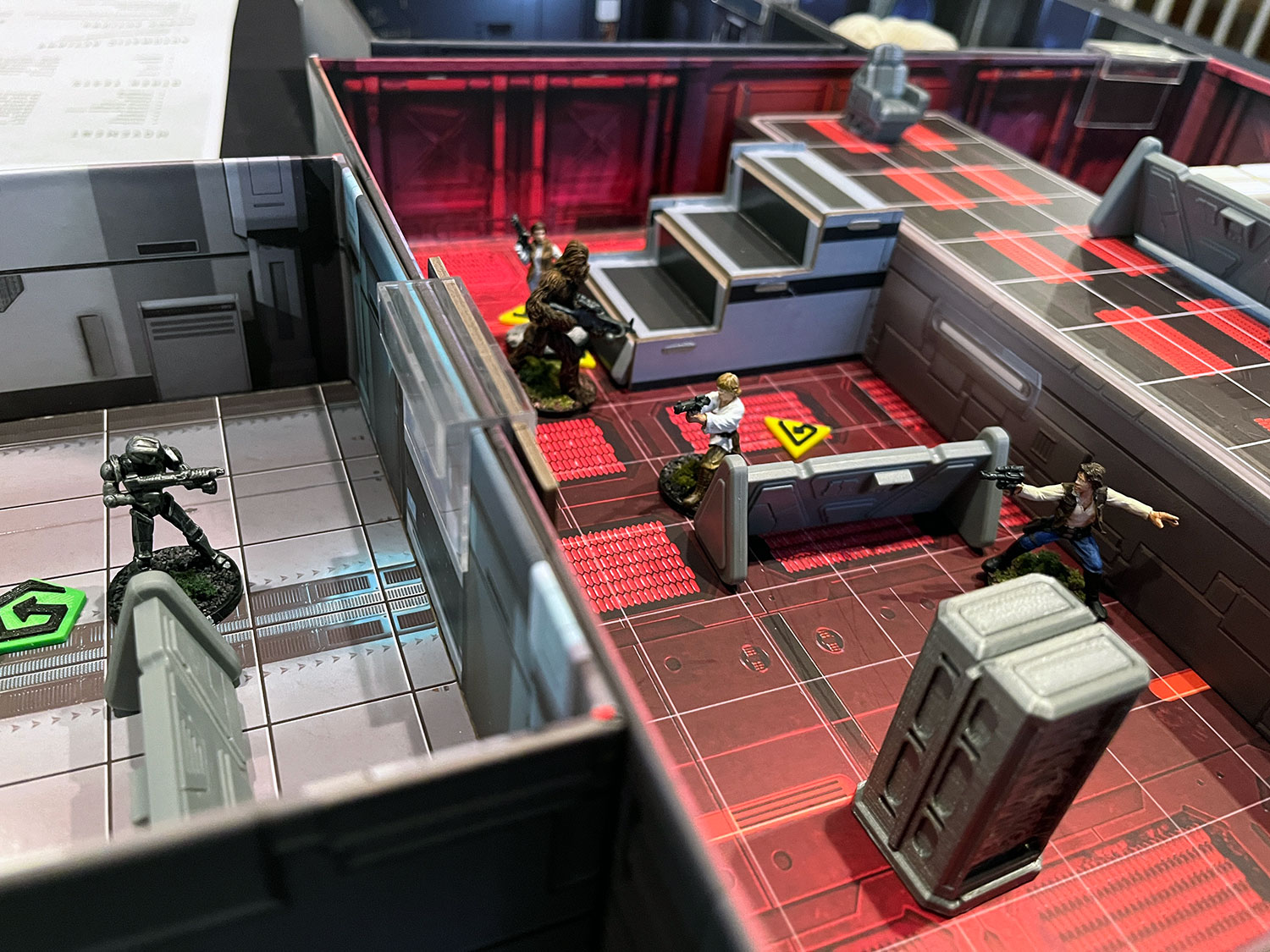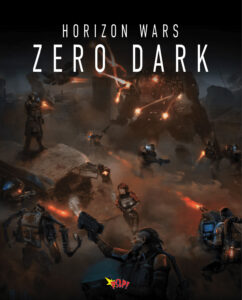 I’m guessing I’m not alone here in having more tabletop games than the actual time to play them. It’s not a bad thing that we gamers are spoiled for choice now, but as much as I spend building, painting, and learning rules for skirmish games, they just don’t get the table time that I would hope. Always so many new things to play on game night.
I’m guessing I’m not alone here in having more tabletop games than the actual time to play them. It’s not a bad thing that we gamers are spoiled for choice now, but as much as I spend building, painting, and learning rules for skirmish games, they just don’t get the table time that I would hope. Always so many new things to play on game night.
However, a while ago I stumbled across a unique option to fix that. It’s a game called Horizon Wars: Zero Dark (not to be confused with Horizon: Zero Dawn) is a miniatures agnostic skirmish game that can be played solo (or even coop/PVP). Solo skirmish games are usually more miss than hit, so does this one actually work? Let’s find out!
Gameplay Overview:
Horizon Wars: Zero Dark has a fairly thick rulebook, but the game itself is pretty streamlined. But to that effect, I’m only going to give you high-level overview of how the game is played. The first thing you’ll need do is assemble your squad. To do that, you choose your team (usually 4 heroes) and assign them stat points (Movement, Fire (shooting), Acuity (mental stat), and Discipline). There are other stats like armor value and Electric Weapons, but those 4 are the primary ones. After that, you’ll want to upgrade your heroes with skills, weapons, armor, and traits. Once you’re happy with your squad, it’s’ time to head out to the mission.

The game doesn’t have a round structure, per se. What happens is that you take an action with one of your heroes, and then you flip a card from the deck of cards (you use a standard playing card deck with 2 jokers). The card flip determines what action and unit the enemy soldiers activate.
Standard actions for the heroes are moving, shooting, interacting with objectives, or healing. To make a check, you roll a number of 12-sided dice equal to the relevant stat (Fire stat for shooting, for example). The game gives you a target number based on a few factors (not complicated once you learn the system), and you use your dice results to try and pass the check.
Say I had a fire value of 4, and hitting a target requires a test of 14. I roll my dice and get a 3, 5, 9, and 12. I could combine the 12 and 3 to get a 15, and the 9 and 5 to give me a 14. That’s two successes on my check. 12s are also considered lucky successes in that they generate a bonus success. So my total for the action would be 3 successes. Any extra successes above what I needed for my check generate bonus actions. Bonus actions are where the game really shines. These extra successes can turn into a free move, shoot, jump, or support token for any of your heroes.
The OpFor’s actions usually involve moving towards your character (if they get into base to base contact, melee happens…which is deadly), and firing or supporting their other characters. The card value determines what enemy activates (number cards for grunts, up to Aces for the Boss) and the suite determines the action they will take. The jokers are complications, which roll off a chart and are all bad for the heroes.
The mission ends when all the heroes are down or the objective has been completed. The game has rules for either 1 off play or campaign style with XP and leveling.

Game Experience:
I was really impressed with how well Horizon Wars works. Creating a rules system for a solo skirmish game is tough, and usually boils down to one player just playing both teams. But Precinct Omega created a system that not only works solo, but is really streamlined. The Action/Draw system means something interesting is always happening. I move my guy, flip a card, move the enemy, and it’s back to me. There are no rounds, and I can activate any hero I want. I can have one hero Leeroy Jenkins in towards a group of grunts, or slowly move my squad up in cover.

I also really liked the Bonus actions system. Succeeding in a test with extra successes lets you give bonus actions to any of your heroes, not just the one that generated it. That means you don’t have to just focus on the hero closest to danger, but can activate one hero, and then use bonus actions on another hero to keep them all useful. But with that in mind, I do need to talk about the Cautious Move action.
There are 3 ways to move your heroes in the game (not counting climbing and such): Cautious, Standard, and Urgent. A normal move is just double your movement value. So if your move is 4, you’ll be moving 8″. A Cautious Move is half your movement value and requires you to make a test equal to 2x your move value (plus a couple of small modifiers). This is a great way to generate bonus actions. In fact, a way to cheese the system would be to make a leader with a high discipline and low movement. Then you can just move the leader 1″, make a simple check, and generate a ton of bonus actions. The key here is that the perk from a Cautious Move is that it cancels the OpFor’s primary ability on its reaction (only allowing it to move, not act). If you abuse this system, the game can get pretty easy and kind of boring. Is it broken? I’m not experienced enough to know, but it’s definitely a powerful ability.
But outside of the questionably powerful Cautious Move, The game is great. It’s flexible, offers a wealth of variety, and even has campaign options. But the best part is that it can be played with pretty much any miniatures you have on hand (assuming they are 28mm scale and sci-fi). So while the game doesn’t work with my Battletech Minis, or your Descent heroes, I was easily able to get in a game with my Cyberpunk Red minis and another with my Star Wars Legion figures. Sure, the powers and abilities aren’t 1:1 with their minis, but that didn’t really matter. I played a game with my Cyberpunk Minis and ran the Trauma Team to rescue a hostage held by the Arasaka gGroup. It was fun, snappy, and I would play it again in a heartbeat.

Final Thoughts:
Horizon Wars: Zero Dark is fantastic and I was pleasantly surprised with how well it works as a solo game. For this review, they sent over a digital PDF of the rules, but I might actually buy a physical printout of the book just to have on the table to be able to flip around quickly. I love how flexible the system is and how it gives me a use for minis I already have painted and ready to go. For those looking for a way to use your various miniatures when you just can’t get friends together for a skirmish game, this is an absolutely fanatic system.
However, on that note, I Should mention that the game does work better solo than coop. With no set turns for units, it’s a bit better to control all 4 heroes because you can make all the decisions to the best of the mission, versus trying to give each player a turn with their hero(s). But overall Horizon Wars: Zero Dark is a win for solo and skirmish gamers. There is even a free tutorial PDF if you just want to try it before you buy it.
Final Score: 4.5 Stars – A unique and flexible system that lets you use any minis you currently have for a fun solo game.
 Hits:
Hits:
• Miniature agnostic system lets you use the components you already yown
• Streamlined and snappy gameplay
• Lots of customization options
• Can play either a campaign or single missions
Misses:
• Cheesing the Cautious Move can make the game a little boring
• The rulebook could be organized a little better
Source: Board Game Quest





